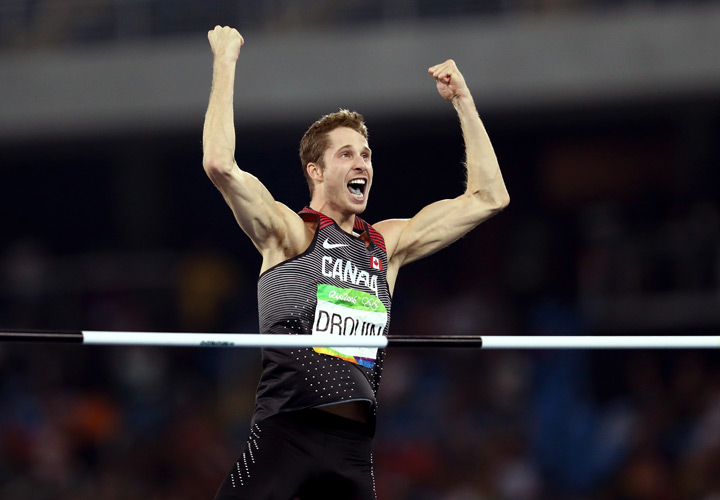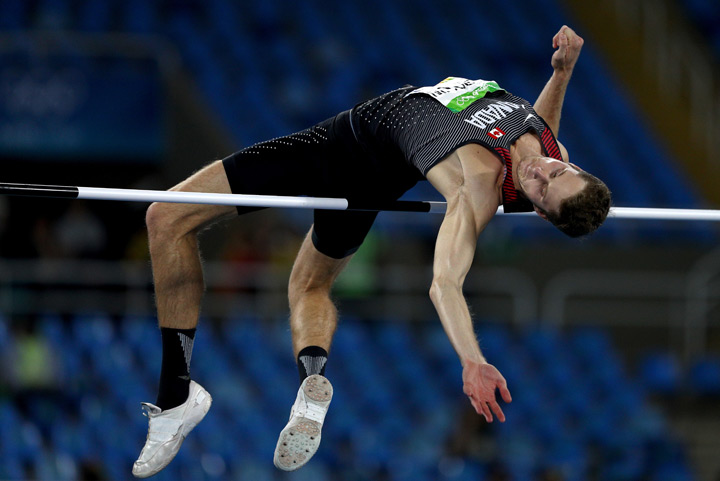Greg Joy sent a message to Derek Drouin on the weekend, telling Canada’s latest high jump star that “we already have a full set of medals and it’s time to start over again with a gold.”

Drouin, the reigning world champion from Corunna, Ont., obliged with a flawless performance to win gold at the Rio Olympics on Tuesday night.
READ MORE: Derek Drouin wins Canada’s 3rd gold medal at Summer Games
“Apparently the young man listens,” Joy said with a laugh in a telephone interview on Wednesday.
Joy, 60, was more than your average television viewer as he watched Drouin give Canada’s its first high jump gold since Duncan McNaughton in 1932. The Vancouver jumper, now living in Ottawa, was one of the stars of the 1976 Olympics in Montreal, where he fell just short of gold and settled for silver behind Poland’s Jacek Wszola.
He was impressed with what he saw from Drouin.
“He was on fire,” said Joy. “From his first jump I thought that, unless he does something catastrophic, he’s got a gold medal.
“He was in a zone. He was flying. He was relaxed. He was everything you need to be to be Olympic champion.”
Drouin did not miss a jump until, with the gold secured, he took a crack at the Olympic record.
His winning jump of 2.38 metres topped Mutaz Barshim of Qatar at 2.36 and Ukraine’s Bohdan Bondarenko, who won bronze at 2.33 but who missed on his attempts to pass Drouin at 2.40.
“When Bondarenko started passing, I knew he was scared because part of the Olympics is being in a rhythm and staying at a confidence and comfort level,” said Joy. “If you pass a jump at a high height and miss the next one, you’re in a hole.
“Bondarenko put so much pressure on himself that I knew it was over.”
The Drouin Dive?
Drouin, whose bronze medal at the 2012 Games in London was Canada’s first in event since Joy’s feat, is unique in modern high jumping for his slow approach to the bar and stiff plant of his right foot, while most jumpers run up to the bar. Some wonder if Drouin will start a trend.
“You never know,” said Joy. “What he’s doing may work for him, but I don’t know because no one else it doing it that way.
“It may be how the (Fosbury) Flop goes in the future, but we don’t know. It may be perfect for him and nobody else or it may be perfect for everyone else and he’s setting the trend.”
But Drouin’s performance should inspire another generation of Canadian high jumpers.
Joy said he was motivated by the Vancouver jumpers who preceded him such as John Hawkins and Debbie Brill.
“I had these people around me, inspiring and showing me that anything’s possible,” he said. “Then mine inspired the next generation, and then Milt Ottey came along and became No. 1 in the world.
“There’s been one after the other, a succession of jumpers that could have won Olympic medals but did really well on the international stage. Now Derek’s just taken the mantle and run even farther.”
A physically punishing sport
Drouin is only 26, so a repeat performance at the 2020 Games in Tokyo is not out of the question. But Joy said a lot can happen in a physically punishing event like high jump.
“I had two Achilles operations and a knee operation,” he said. “Before I went to the Olympics I had a weight drop on my toe, which put me out for three weeks.
“Then I pulled a muscle in my hip and I couldn’t train for another week and a half. Then my operations basically ended my career, so you never know. He could be around for a long time or he could have a catastrophic injury the next day. Let’s hope he’s around for a long time.”
One thing Drouin probably won’t have to worry about is being broke. After winning silver in 1976, Joy arrived at Vancouver airport with empty pockets. His parents were still working their way back home by car. So he had to hitch-hike home. That’s not likely to happen to a top performer in modern athletics.
“Maybe he’s got a private jet,” quipped Joy.



Comments